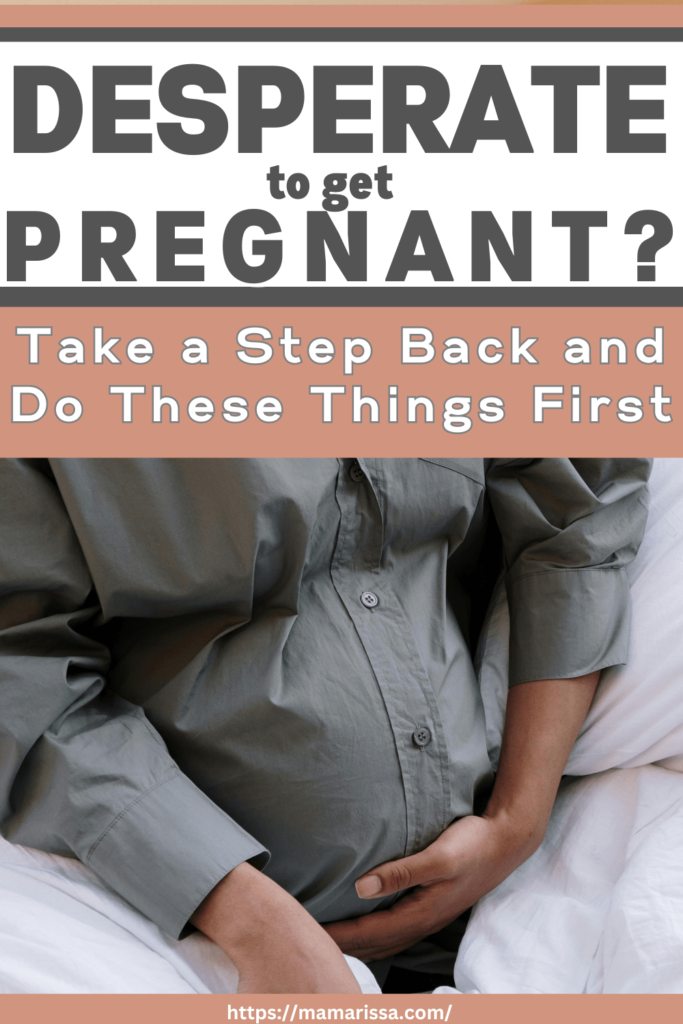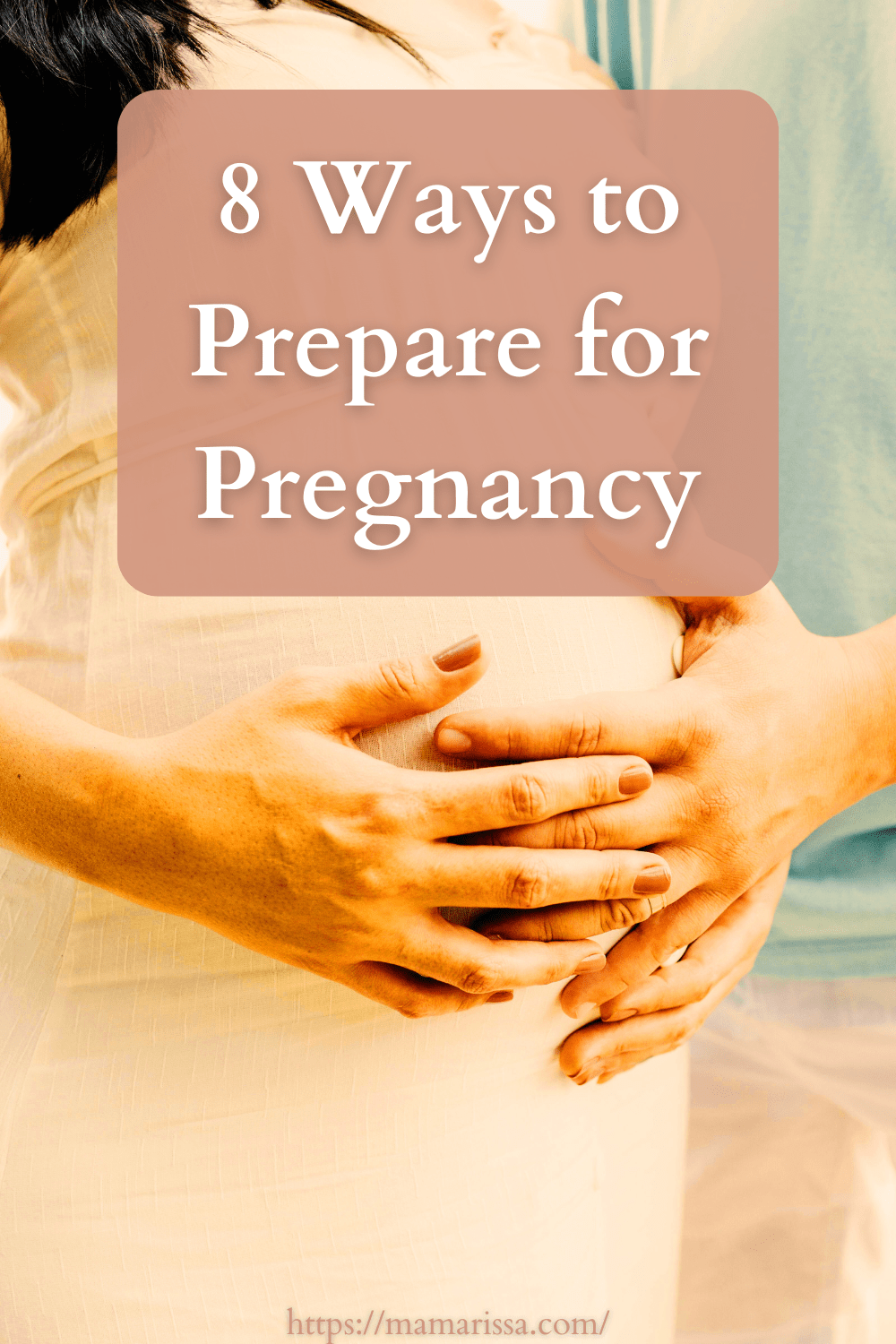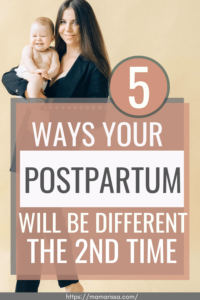Your cart is currently empty!
8 Ways to Prepare for Pregnancy
When I reminisce about the time when I conceived my first baby, I am shocked by how little I did to prepare for pregnancy. Considering what a Google-aholic I am now when it comes to everything pregnancy, babies and toddlers, I can hardly believe I didn’t think to do anything to get ready for my first pregnancy.
But the fact is, I was simply inexperienced and didn’t know I was supposed to do anything to prepare for pregnancy. And in reality, there isn’t a lot that absolutely must be done prior to conception, so don’t freak out if you’re 13 weeks pregnant while reading this.

But there are some things that you can do to get your body and mind in optimum shape to have a baby. Most of these things can be done after you are already pregnant as well.
Hey Mama, if you find my blog posts helpful, would you help support this blog by making purchases through product links on this page? It will not cost you any extra but the commissions I receive as an Amazon and brand affiliate help to cover the costs of operating this blog so that I can keep it running ad-free. Thank you so much for your support. You are literally the reason this blog was started and the fuel that motivates me to keep it going!
Please note that I am not a medical professional and nothing in this post should be construed as medical advice.
How to Prepare for Pregnancy
Deciding to have a baby is one of the most exciting moments in a couple’s relationship.
But before purchasing a bunch of ovulation predictor kits (OPKs), focus on getting yourself ready to be the habitat and sustenance for another human being by doing the following 8 things to prepare for pregnancy.
1. Wean Off of Dangerous Medications
According to the FDA (Food and Drug Administration), half of the pregnant women in America are taking some kind of medication.
While some women require medication during pregnancy, it is important to figure out if your medication is safe to use during pregnancy before you conceive.
When my husband and I got married, I was taking some medications that were listed as class C for pregnancy. Even though we weren’t planning on children right away, this was a concern for us looking into the future.
CHEMM (Chemical Hazards Emergency Medical Management) explains class C as meaning that animal studies have shown the medication to be harmful to fetuses, but there are not enough quality studies to prove this is the case in humans.
To me, a lack of human evidence does not mean there are no problems. I knew I wanted those medications out of my system long before having a developing baby ingesting everything going into my body. So I got off of them.
Read 4 Things You Didn’t know You Should Avoid During Pregnancy here.
If you are taking any medication – even over-the-counter – while trying to prepare for pregnancy, it is best to discuss it with your doctor to find out what class the medication is and weigh the risks and benefits of continuing to take it.

2. Start Taking Folate
When I was pregnant for the first time, it was pretty obvious I did not prepare for pregnancy when my mom asked if I was taking a prenatal vitamin and I responded that I didn’t realize I was supposed to.
But, after discussing the purpose of prenatal vitamins with my mom, I questioned the necessity of this highly marketed and medically advised product.
I did not rush out to purchase a bottle of promised baby health and wellness pills – which did not exist for the first few thousand years of successful human existence and procreation.
Instead, I looked up what vitamins have been proven to make a positive difference in pregnancy outcomes. The main vitamin I found to be consistently proven to be beneficial is folate.
Get my FREE list of questions to ask your OBGYN before you get pregnant by entering your email at the bottom of the page!
I am not going to tell you whether or not you need to take a prenatal vitamin. We will save that research for another post. For now, what I know for certain is that it is important to take folate or make sure you are getting enough of it in your diet.
The reason this vitamin is so important is because it prevents spinal cord and brain birth defects in the baby. This has been proven in multiple studies, while other potential benefits of folate are still being evaluated.
Folate is also referred to as folic acid when it is in pill form. Folate is what is naturally found in food while folic acid is a man-made, supposedly easier-to-absorb version of it.
Personally, I just don’t think God needed us to create a fake version of what He initially created Himself in order for our bodies to be able to accept it. So I stick with pills that specifically state “folate derived from food” like this one.
Of course, the best way to get folate is through foods that naturally have lots if it, such as spinach, lentils and beans. Lentil soup is super easy to make and two cups of cooked lentils per day is enough to meet your daily pregnancy requirement of folate.
However, morning sickness can make it nearly impossible to get the ideal amount of folate through food, so take a supplement if you are struggling to meet your daily requirement once pregnant.
3. Start Taking a Probiotic
Something I did not do to prepare for pregnancy either time I was hoping to conceive was take a probiotic. But I learned my lesson well after my daughter was born with infant acid reflux which persists to this day (she is currently 22 months old).
Read about my infant reflux journey here.
I blame the reflux on two factors: 1) receiving copious amounts of antibiotics during labor to combat Group B Strep (GBS) and 2) my own subpar gut health.
The good news is, taking a probiotic is one of the simple ways to deal with both of these negative situations as well as other health concerns that can arise for baby during and after pregnancy.
While studies are somewhat conflicting, there have been some indications that probiotic use during pregnancy can help kill off Group B Strep colonization – a condition which is common and mostly harmless in pregnant women but can cause serious health complications for the baby after delivery.
In this study involving 57 GBS positive pregnant women, all participants were treated with a particular stain of probiotic called lactobacillus salivarius CECT 9145. After 12 weeks of treatment, 68% and 72% of the women were GBS negative in the rectum and vagina respectively.
For me, if there is anything I can do to cut down on the likelihood of being GBS positive and needing gut-destroying antibiotics during labor next time around, I will do it.
Check out this post for more details on my 37-hour labor experience.
But reducing the risk of needing antibiotics during labor is not the only way taking a probiotic can help you on your journey to motherhood.
The research is still emerging in this area, but it is becoming more and more clear that the balance of bacteria in the mother’s gut may profoundly influence the developing baby’s health in numerous ways including contributing to or preventing allergies, autism spectrum disorders and preterm labor.

We may not know all the details yet, but we know that optimum maternal gut health can only positively effect a developing baby and that probiotics have the potential to aid in improving gut health.
The sooner you start improving your gut health, the better shape it will be in by the time you are carrying another life to nourish.
Update 5/16/2024: This probiotic by Innovix Labs is a really good, potent, high quality option that I currently use for my own gut health as well as my daughter’s. It has 31 different strains of probiotic as well as prebiotics and they are third-party tested for purity.
4. Eat Balanced, Healthy Food
Eating healthy should also be high on your list of things to do to prepare for pregnancy. Once you are pregnant, morning sickness and food aversions may make it ten times harder to eat healthy, but at least you can stock up on some nutrients now!
Find out how to stop eating your way through motherhood in this post!
In addition to building up a store of nutrients for your future baby, eating healthy can also increase your chances of conceiving. According to this review of the current research, diet has a significant impact on fertility in both men and women. This is the perfect excuse to get your husband eating healthy too.

Eating a balanced diet based on U.S. Dietary Guidelines of fruits, veggies, fish, polyunsaturated oils and whole grains or, similarly, a Mediterranean diet have been shown to decrease infertility rates significantly.
Healthy eating will also keep you feeling better inside and out, so it’s a win all the way around.
5. Exercise
When I was trying to conceive before both of my pregnancies, I was afraid to exercise much. I was also afraid to exercise during my pregnancies. I thought exerting myself might harm my potential baby.
However, research has shown the opposite. AJOG (American Journal of Obstetrics and Gynecology) published an article examining numerous studies that have been done documenting the effects of exercise on pregnant women.
The article found that exercise during pregnancy has clearly been shown to improve health outcomes for mom and baby. Some of the benefits include reduced likelihood of gestational diabetes mellitus, excessive gestational weight gain, preterm birth, gestational hypertension, and c-section.
Interestingly, the article noted that there is no evidence of harmful effects of exercise during pregnancy. There is even evidence that exercise could help some conditions for which many doctors prescribe bed rest – something which has known harmful effects on pregnancy.
As for exercising while trying to conceive, the research is limited and mostly focuses on the effects of regular high intensity physical activity. While consistent vigorous activity can cause fertility issues in low- to healthy-weight women, it has the opposite effect on overweight women.
Fertility is not likely to be negatively effected for the average woman who is simply following WHO’s (World Health Organization) recommendation of 150 minutes of moderate intensity or 75 minutes of vigorous intensity aerobic activity per week.
Considering the well-proven benefits of exercise to a non-pregnant person as well as a pregnant person, I would say it’s safe to assume that a balanced exercise routine will be a healthy addition to your trying-to-conceive plan.

6. Start Going to a Chiropractor
I started going to a chiropractor for adjustments while I was trying to prepare for pregnancy my second time around. I was simply seeking relief from a pulled muscle in my neck at the time.
However, at my first visit, the chiropractor told me getting regular adjustments could help me get pregnant. He said he had several patients who had trouble conceiving until they started coming to him. Then, all of a sudden, they got pregnant.
Find out my top 3 tips for dealing with pregnancy back pain here!
He explained the reason for this being that the whole body works together and when one part of the body is out of whack, other parts can be too.
I guess he was right because it was only weeks after my first visit that I got pregnant!
7. Find a Good Doctor or Midwife
When I conceived the first time, I was pretty surprised to discover that the OBGYN I was planning to see didn’t want me to come in until I was 8 weeks along. For some offices, it’s standard for your first appointment to be as late as twelve weeks, which can leave an expectant mama with a lot of concerns.

After I hung up from that phone call to schedule my first appointment, I was left feeling confused and a little scared. What about all the questions I had written down to ask the doctor?
Enter your email at the bottom of this page to get FREE access to my list of questions to ask when interviewing OBGYNs/midwives.
I didn’t feel like my baby could wait until the ripe old age of 8 weeks gestation to get the best treatment possible. And on my own, I wasn’t sure how to know what the best treatment was.
Consequently, I highly recommend that you find and visit an OBGYN or midwife before you actually conceive to ask any questions you have about how to care for your unborn child.
8. Continue Pursuing Your Goals
Trust me when I say the last thing you want to do to prepare for pregnancy is put everything else on hold while you try to conceive. There are two very good reasons for this.
- Reason #1
First, if you decide to stop doing something in order to focus on getting pregnant, you are setting yourself up to obsess over calculating cycle days, endlessly staring at the five pregnancy tests you take a week before your period is due, and hours spent Googling “pregnancy symptoms one day post-ovulation.”
Read this post to learn how to take a pregnancy test without stressing out.
It may sound like fun or even necessary to quit your job to be a stay-at-home mom-in-training, but it will make you absolutely miserable and will probably only heighten your stress, making it more difficult to conceive.
- Reason #2
The second reason you shouldn’t put your life on hold to prepare for pregnancy is one I am cautious to mention. But it’s a reality I dealt with that I was not expecting and was totally unprepared for: The possibility of miscarriage.

When we were trying to conceive for the first time, my husband and I were in the midst of transitioning our lives to a new city. I was looking for a job in this new city in the same line of work in which I was currently working.
But I kept questioning if I should even be trying to get a job since I knew I would be staying home with the baby we were trying to have. Ultimately though, I did get a new job with barely a break after leaving my previous job.
I had been at my new job for only a week when I discovered I was pregnant. At that point, I assumed I would only work until six months into my pregnancy.
However, my heart broke on a Friday morning at ten weeks along when I was told my baby no longer had a heartbeat.
Read my full miscarriage story here.
At this point, I was extremely grateful to have my part-time job keeping my mind somewhat occupied so I didn’t go crazy with grief and obsessively trying to conceive following my miscarriage
My part-time job soon became a full-time job with amazing insurance benefits that almost entirely covered the cost of giving birth to my rainbow baby a year and a half later. Not to mention the fact that I learned and grew a lot through that job before leaving to stay home with my daughter.
Find out what it’s like to be a stay-at-home mom in this comical take on the career of motherhood.
Looking back, I am so grateful I took that job instead of having a year and a half of anxiously waiting at home for a baby that took much longer to come than I expected.
The Best Way to Prepare for Pregnancy
The number one best way you can prepare for pregnancy is to relax and be patient. Have an open mind. Don’t set time limits on yourself.

Try not to plan your future around the assumption that you will have a newborn in nine or ten months. Don’t alter major life plans based on your hoped-for child unless it is truly necessary.
For example, I would not recommend turning down the opportunity to train for a management position at your job based solely on your belief that you will be pregnant and taking care of a newborn soon.
I also do not recommend planning out how, when and where you will announce your pregnancy if you get pregnant this cycle. Yes, I have been there and done that many times. It only gets your hopes up unnecessarily.
Being as easy-going as possible will serve you well in this season of life.
Whatever happens on your trying-to-conceive journey, I wish you a positive and low-stress experience!
If you are trying to conceive following a miscarriage, read this post for more insight on what to expect during this emotional time.
If this post helped you, please share it on social media to help other mamas and mamas-to-be.


10 responses to “8 Ways to Prepare for Pregnancy”
[…] Read “8 Ways to Prepare for Pregnancy“. […]
[…] this post fund out how to prepare for […]
This is great advice! Love the chiropractor, exercise, and probiotics.
Elizabeth,
Thank you! They are all important and helpful for sure!
This is definitely an informative article for first time moms! Thanks for sharing these tips in great detail!
Faith,
You’re welcome! I certainly hope it does inform other women like my former self who are trying to learn about pregnancy without any experience to guide them.
These are some great tips. I wish I had a post like this when I had my lo. Thanks for sharing.
Kam,
Thank you! I hope it will help other mamas and mamas-to-be who are figuring things out.
When I had my firstborn, I was so into looking for info and info for anything and everything. Looking back, it is way better to relax and not plan so much in advanced like you mentioned.
Mama Bear Finance,
It can be hard to find the right balance between doing your research and not obsessing over every little thing. But it is definitely important to relax while trying to conceive and during pregnancy.










Leave a Reply